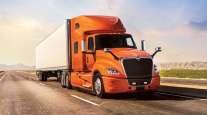Clarke: Brace for Change

This story appears in the March 6 print edition of Transport Topics.
NASHVILLE, Tenn. — The business world of 2030 could be a model of orderly, incremental evolution, or it could bound off unexpectedly, forcing firms into obsolescence.
Navistar International Corp. Chair- man and CEO Troy Clarke said here he has a sneaking suspicion it will be the rough-ride option — which could lead to lots of electric trucks — and urged a group of fleet maintenance directors to prepare for that possibility.
The day before those March 1 remarks to the Technology & Maintenance Council of American Trucking Associations, Navistar and Volkswagen’s Truck & Bus division completed their alliance announced in September, with the German automotive company acquiring 16.2 million common shares, or 16.6% of equity, and the Lisle, Illinois, truck maker getting $256 million.
The deal was announced March 1 after government regulators approved the transaction.
Having shored up Navistar’s future, Clarke offered thoughts and observations about the future of trucking.
“How do we claim a piece of the future, no matter what it is? I think the changes we see are not going to be small and incremental,” Clarke said.
He said that he sees several freight transportation trends converging in North America and Europe, and that companies that can master those changes should do better.
More people are moving to cities or large metropolitan areas and insist upon a certain level of clean air, he said. Therefore, he anticipates the growth of heavily populated low- or zero-emission zones that will need a lot of goods.
Related to population growth, Clarke said highway congestion will continue to increase, wasting ever- larger chunks of people’s time.
A third important trend is the expectation electricity will remain plentiful and at prices that will remain stable or perhaps even dip. Combining these three thoughts, Clarke said it is quite possible that electric trucks will play a much bigger role in U.S. transportation.
By 2030, he said, we could see highly automated and efficient diesel- powered trucks making linehaul moves among major regional hubs. After freight is off-loaded at a hub, it would be transferred to smaller hybrid-electric or pure electric trucks for final delivery.
Clarke warned about the dangers of entrenched success, saying it leads to protectiveness of the status quo and resistance to necessary change. Once there were great manufacturers of wind- powered cargo ships, steam engines and horse-drawn buggies; and what were the names of those great companies, he asked. “Nobody knows and nobody cares.”
Clarke said in an interview shortly after the VW deal closed that final approval was not in the United States or Europe, “but in one of the other places where we both do business.”
The transaction leaves Navistar with three separate major owners who collectively own about half of the original equipment manufacturer: Carl Icahn, Mark Rachesky and VW. Icahn and Rachesky have each had two seats on Navistar’s board of directors, and now VW has two.
Joining the board are VW Truck & Bus CEO Andreas Renschler and Chief Financial Officer Matthias Grundler. Clarke said they joined the board Feb. 28, raising membership to 12.
Clarke said the VW money will be used for general purposes and that it gives the parent of International trucks and engines breathing room.
Clarke has been leading Navistar’s turnaround effort since 2013, during which time the company has carefully monitored cash reserves.
“We do manage cash specifically and deliberately,” Clarke said. “We don’t anticipate using the money immediately, but it is good to plus-up our balances.”
Although useful, the money probably is not the most important part of the deal. Clarke said the two companies remain separate but will collaborate extensively.
Most obvious is the new procurement joint venture, with the OEMs pooling their purchasing power. Clarke said this will have three components: basic commodities, including oil, antifreeze and paints; components, such as fuel pumps; and the development of future products.
“This is a longer thing, where technology and procurement overlap,” Clarke said.
Executives and managers from the two companies had been talking about how to proceed on a somewhat detached, conceptual basis. Now, Clarke said, they are plunging into specifics.
Not only are engineers and other professionals working with each other on trucks and engines in Lisle and Truck & Bus’ headquarters city of Braunschweig, Germany, but on technology.
Clarke said Navistar and VW share an interest in connected vehicles, or the “digitization” of commercial vehicles, as the Germans call it.
“This is a huge area,” Clarke said, of telematics for maintenance and customer service, and technology for active safety systems, autonomous driver assistance and platooning.
“There’s as much excitement here [in technology] as in the greasy bits” of oil filters and wheel ends.
Technological advancement was sometimes difficult as a stand-alone company, Clarke said. That could mean prioritizing between developing a new cab and working on emissions regulations.




